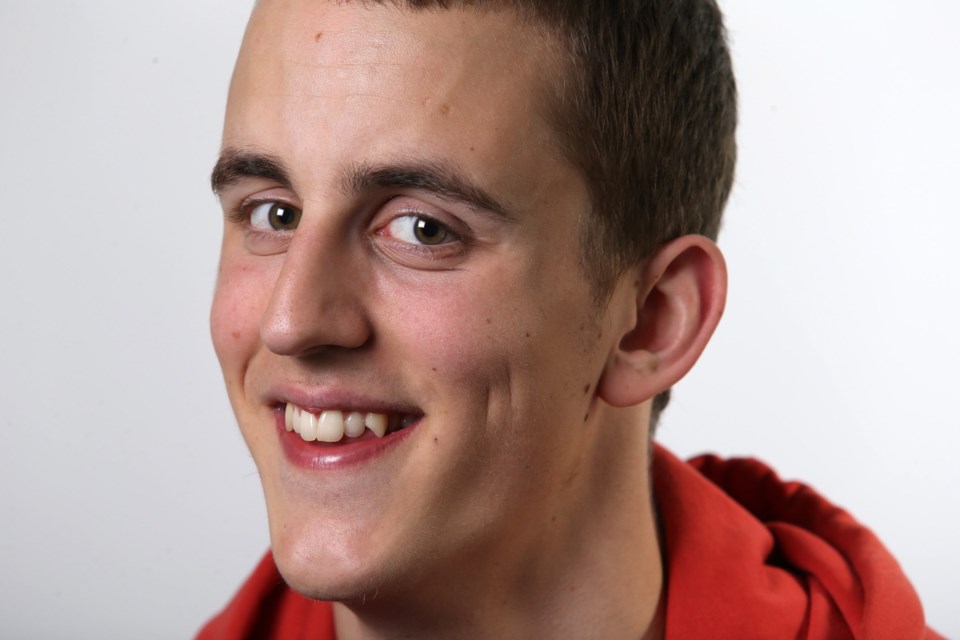Three days ago, Kevin Breel got an email from a girl in the U.S.: She had written the suicide note, she had the gun — and then she saw the Saanich teen’s talk, posted online. She put down the gun, sought help instead.
Breel is a funny guy, a standup comic and writer, just like he dreamed of being in high school.
Those of us who follow him on Twitter eat up his take on the world, seen through 19-year-old eyes. Some examples:
• “Sure I don’t ‘have any kids’ but one time I briefly misplaced my iPhone in a crowded coffee shop, so I think I get the gist of it.”
• “Would be pretty cool if you went to a party in the 1930s and everyone was just obsessively looking at their letters.”
• “Most girls are completely unaware of this, but you can actually eat food without taking a picture of it first.”
Here’s what we didn’t know: Breel has clinical depression.
And now, suddenly, people near and far are clamouring to talk to him about what had been his darkest secret, the one that had him on the edge of taking his own life a couple of years ago.
What has them fired up is a talk he gave at a West Vancouver TEDx conference in mid-May, a video that took off this week after being posted to Upworthy.com.
His story, abbreviated, is this: He grew up in Cadboro Bay, a popular kid, fun at parties, English and drama awards, always on the honour roll, captain of the Lambrick Park basketball team when it was ranked No. 1 in the province.
Under it all was the other him, the kid who plunged into depression at age 13 when his best friend died in a car crash. “Depression isn’t chicken pox. You don’t beat it once and it’s gone for ever,” he says in the video. “It’s something you live with. … It’s the roommate you can’t kick out.”
His greatest fear was being discovered. “That fear made me feel as though I was forced into a corner, that … there was only one way out, so I thought about that way every single day.” He came way too close once, sat on his bed with the pills, pen and paper at hand.
The thing is, as isolated as he felt, he’s not alone. The Canadian Mental Health Association says three to five per cent of people suffer from depression at any given time. Between 10 and 20 per cent will experience it at some point.
Eventually, Breel began to talk about it, going into schools and youth clubs at age 18 to tell kids the things that no one told him. Breel has done 30 or so talks this year alone, lightening his presentations, typically 45 minutes to an hour long, with humour.
The TEDx gig, by contrast, was a stripped-down, laugh-free 15 minutes. He spoke of the stigma of mental illness — break your arm and people run to sign the cast, but tell them you’re depressed and they run the other way. Shouldn’t be that way. “It’s an issue, it’s not an identity,” he told the crowd.
“Most of those things I said at TED, I’ve never said before,” he said Friday in an interview.
The response was overwhelming, particularly after the talk was posted to Upworthy.
“I have 600 unread emails in my inbox right now.” People are reaching out from Auckland, Chicago, Connecticut. Universities and colleges want him to speak. People have been forwarding the video to family and friends, saying: “This is how I feel, too.”
“For me, it’s massively freeing,” he says. Two years ago, his worst fear was anyone in high school discovering he had depression.” Now he talks about it to hundreds of strangers at a time.
It’s a far cry from the lonely days when, bathed in the Monday morning adulation after a big basketball victory, he would feel hollow inside, put off by praise from those who didn’t really know whom they were praising.
Much more rewarding are the responses he gets today, when he knows his openness is making a difference.
“I hope you had a good day today,” wrote the American girl who wrote to say she had sought help after seeing Breel’s video this week.
“You made it a great day,” he replied.



